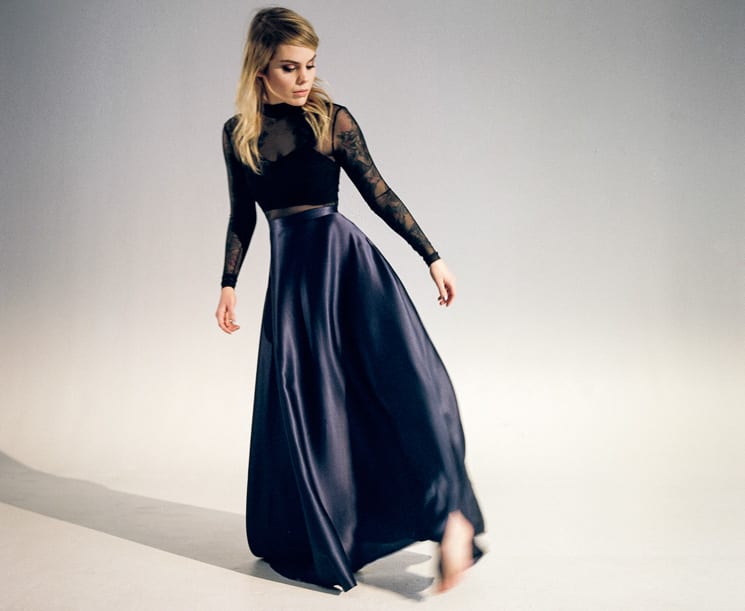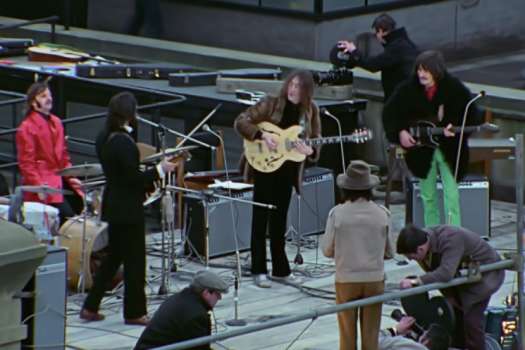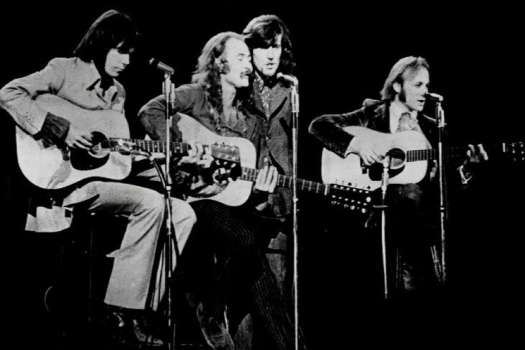"All my fears and anxieties and all that crap that humans go through — I didn't face them because I was so busy putting my energy into the boys that had destroyed me."
Béatrice Martin is talking about the kind of breakup where foundations collapse, whole worlds vanish and you hate what remains because it all looks and feels familiar, but it's totally different now. Like a dystopian reality, but instead of a post-apocalyptic landscape it's emotional and physical chaos, the kind that leaves you sifting through the debris of depression, addiction, loneliness, heartbreak.
"I went through things that I never talked about on my other two records," Martin reveals, over the phone from a festival in France. "I was so angry and — ugh, vengeful in some ways. But I went from this very negative vision of love to a very beautiful one. You have to fight for it and you have to keep it alive and it's hard, but it's beautiful. This album pretty much talks about this transition of those horrible times, then meeting someone, and knowing the biggest love of them all, which is being a mom and stuff, that's pretty cool."
---
This is the journey of Coeur de pirate's third record, Roses, the first bilingual affair from the 25-year-old piano-pop star, and her most visceral and vulnerable offering to date. It's an emotional map and a physical one, too. Most of the songs correlate to the locations of Martin's most pivotal moments from the last half-dozen years: Banff, Paris, Toronto, Vancouver, Tofino and her hometown of Montreal.
The new album is a significant departure from the songs Martin composed for her self-titled 2008 debut, which primarily featured her and her piano. Quebec, France and Belgium couldn't get enough, and Coeur de pirate's catchy piano-pop attracted plenty of non-French speaking fans as well. Her followup record, 2011's Blonde, moved away from the piano and incorporated plenty of '60s swing and retro influences. It was a happy-sounding pop record and incredibly charming, where even the pissed-off kiss-offs sounded fun and Nancy Sinatra-esque.
Roses features the biggest, lushest production yet on a Coeur de pirate record: think Florence and the Machines and Lykke Li, polished yet still weird and wild. It also took Martin well outside her comfort zone of recording in Montreal to studios in Stockholm, Bristol and London, working with producers Björn Yttling (Robyn, Lykke Li), Rob Ellis (PJ Harvey, Bat for Lashes) and Ash Workman (Metronomy).
Lyrically, Blonde hinted at the upheaval in Martin's life but Roses is unflinching in its clarity. "When I released the second album, Blonde, I was going through this very, I don't know, I guess publicized relationship with somebody who was in a very popular Canadian band," Martin laughs nervously. Her ex is Jay Malinowski from Bedouin Soundclash, with whom Martin briefly formed a band called Armistice, releasing one five-song EP.
"I was victimizing a lot, and I was sort of an enabler," Martin says. "I was somebody who tagged along sort of to help out, but I wasn't really helping. I had my part of responsibility in whatever was happening. Going through a relationship that was — I don't want to diss him. I still respect him. But he had a lot of issues and I had a lot of issues and we just kind of burst into flames, it was just not good. Me enabling him, me enabling my friends, me following everybody and hurting myself in the process — that was a tough part of growing up that I didn't like too much."
One of the first songs Martin wrote for Roses was "Oceans Brawl." She recalls a lonely time facing the Pacific Ocean in Tofino, BC, freshly broken up. He was drawn to the Pacific; she had to cross the Atlantic all the time, criss-crossing back and forth from France.
"Not to sound corny or anything, but for me, our whole fighting, our whole relationship not working out, was these two oceans colliding — even though that's not possible — and the rumbling sound of it all," Martin says.
The water references echo throughout the record, sometimes overtly and lyrically, and other times through the production in small, knowing, unobtrusive ways.
"You get into your 20s and it's kind of weird, because you want to change your mind all the time, and you have to grow up in the eyes of the public, and you don't really know where you're going," Martin laughs. "I thought that I could compare my emotions inside to the movement of the water. How something so brutal could be so peaceful at the same time, and how it changes all the time, with the movement of the moon and everything, and that's just basically how I felt all the time."
She was also facing moments of depression and isolation on the road. "There are some things you experience that are amazing, like playing shows, playing in front of 10,000 people, and then you're back in your little room afterwards and you're alone." She laughs a little at the ridiculous extremes. "And maybe something didn't happen right, your monitor wasn't working and your voice is all scrapped up and you're tired and you don't sleep well at all because you ride in a tiny van, but that's just how it is. You have all these highs from touring and the flow of everything, but I remember being very lonely at times and very sad. Which is normal when you're alone in this. I don't have a band band. I'm alone with everything."
That loneliness is evident throughout Roses, but it's not an overwhelmingly sad record. Rather, it's full of vaulted choruses and crashing, crescendoing arrangements, unusual beats and dynamic, epic, sprawling moments of redemption and forward momentum.
---
Between the breakup and now, everything in Martin's life has changed. She married French tattoo artist Alex Peyrat in 2012, and gave birth to their daughter, Romy, a few months later. She recorded a fantastic album of covers for the fifth season soundtrack of Quebec's number one television show, Trauma, and she composed the soundtrack for the videogame Child of Light. She came through everything stronger, her pirate heart pieced back together, bigger and wiser than before, affording her the space to explore the devastation of her past. Roses became a record much more about catharsis and looking back than living in the thick of things.
She remembers writing what would become Roses' first single, "Carry On," a soaring, stirring anthem about moving on and letting go. Specifically, Martin says, it's about "realizing you have enough love around you, and love for yourself, to move on from whatever relationship you had before. It's important to know when it's over, and that has to come from you. When I wrote the song, I was like, 'Great, this is for me, but maybe it will ring a bell with other people.'"
Some of Roses' most upbeat songs belong to France — "It's a good place for me. That's where I met my husband, and we go back and forth and it's my daughter's second home; the public really adopted me" — whereas Toronto bore the brunt of her heartbreak for a long time.
"I think Toronto was the big UGH," she groans, laughing. "I love Toronto! I really do! But for a while I didn't even go afterwards. I was so heartbroken. I remember going pregnant and I was like, 'Ahhh, I don't want to be here,' and it was really rough, but now I love it."
Motherhood — Romy turns three in September — has provided Martin with a different perspective on almost everything, including her relationship with her own mother. "Drapeau blanc" or "White Flag" talks about her mom; Martin says it was the hardest song to write.
"I don't hate her, we don't have a bad relationship, but it was kind of tricky at times, because she was the one that introduced me to piano and was next to me rehearsing every day," Martin says. "When I stopped playing piano classically at the conservatory, it broke her heart because she saw something in me that I didn't see, clearly. It's a good thing I still play piano — I think she saw that, but I think she thought I would be a concert pianist, Lang Lang-style, [laughs] but no, that didn't happen.
"I had a mom figure, but, like, an authority figure, and I didn't really know how to blend the two. When I had Romy, I realized [my mom and I] had to reach out, because otherwise we won't talk to each other anymore because we don't always agree. It's hard, it's really hard. I don't know, sometimes it's all in together and it's great. For me, it was more of a push-and-pull kind of thing, but I still love her."
Motherhood, Martin says, made her a better songwriter, a better musician and a better person. "It really did make me a better version of myself," she says with a laugh.
Romy's piece of the Roses map is the gorgeous and sparse "Way Back Home," a love song that's equal parts light and shadow. "I wrote this song when I was in Banff, which was right before I started recording the album, and I was really sad because I wasn't with my daughter and I was 7,000 kilometres away and I was like, 'When she is 15, she'll hate me forever because maybe I'll be gone again and maybe I won't be there for her and I'll be like that mom on The Killing,'" Martin laughs. "I don't want to become that. I don't want to become Detective Linden. So, I was like, I have to make amends with her later somehow even though she doesn't realize it now. That's her song."
The beating heart of Roses is how it captures, beautifully, the much hoped-for trajectory we all desire coming out of hardship: surviving, thriving, and the triumph of love. Martin is on the other side, happy with the amount of living she's managed to pack into her first 25 years.
"I'm glad I did all the growing up too fast, 'cause now I'm good," she laughs. "I don't have to do anything more. It's pretty rough if you're, you know, 40, and don't know where you're going, which is the case for a lot of people in our generation right now. It's normal, I get it, it's fine, it's our generation. But no, I'm glad it happened to me. I needed to be grounded."
Martin knows she's offered up a lot of herself, her life, in Roses' petals, and yes, it's been cathartic, but that's only a small part of why she makes music.
"It's kind of weird, and I do feel better," Martin says. "Now I have to give it to everybody and everybody's going to know everything. That's fine, that's okay, but the important part is that they find themselves in those songs. That's the main reason why I do this, otherwise I wouldn't be doing it. It's not even like turning a page; it's like a brand new book. It's just me starting over."
Béatrice Martin is talking about the kind of breakup where foundations collapse, whole worlds vanish and you hate what remains because it all looks and feels familiar, but it's totally different now. Like a dystopian reality, but instead of a post-apocalyptic landscape it's emotional and physical chaos, the kind that leaves you sifting through the debris of depression, addiction, loneliness, heartbreak.
"I went through things that I never talked about on my other two records," Martin reveals, over the phone from a festival in France. "I was so angry and — ugh, vengeful in some ways. But I went from this very negative vision of love to a very beautiful one. You have to fight for it and you have to keep it alive and it's hard, but it's beautiful. This album pretty much talks about this transition of those horrible times, then meeting someone, and knowing the biggest love of them all, which is being a mom and stuff, that's pretty cool."
---
This is the journey of Coeur de pirate's third record, Roses, the first bilingual affair from the 25-year-old piano-pop star, and her most visceral and vulnerable offering to date. It's an emotional map and a physical one, too. Most of the songs correlate to the locations of Martin's most pivotal moments from the last half-dozen years: Banff, Paris, Toronto, Vancouver, Tofino and her hometown of Montreal.
The new album is a significant departure from the songs Martin composed for her self-titled 2008 debut, which primarily featured her and her piano. Quebec, France and Belgium couldn't get enough, and Coeur de pirate's catchy piano-pop attracted plenty of non-French speaking fans as well. Her followup record, 2011's Blonde, moved away from the piano and incorporated plenty of '60s swing and retro influences. It was a happy-sounding pop record and incredibly charming, where even the pissed-off kiss-offs sounded fun and Nancy Sinatra-esque.
Roses features the biggest, lushest production yet on a Coeur de pirate record: think Florence and the Machines and Lykke Li, polished yet still weird and wild. It also took Martin well outside her comfort zone of recording in Montreal to studios in Stockholm, Bristol and London, working with producers Björn Yttling (Robyn, Lykke Li), Rob Ellis (PJ Harvey, Bat for Lashes) and Ash Workman (Metronomy).
Lyrically, Blonde hinted at the upheaval in Martin's life but Roses is unflinching in its clarity. "When I released the second album, Blonde, I was going through this very, I don't know, I guess publicized relationship with somebody who was in a very popular Canadian band," Martin laughs nervously. Her ex is Jay Malinowski from Bedouin Soundclash, with whom Martin briefly formed a band called Armistice, releasing one five-song EP.
"I was victimizing a lot, and I was sort of an enabler," Martin says. "I was somebody who tagged along sort of to help out, but I wasn't really helping. I had my part of responsibility in whatever was happening. Going through a relationship that was — I don't want to diss him. I still respect him. But he had a lot of issues and I had a lot of issues and we just kind of burst into flames, it was just not good. Me enabling him, me enabling my friends, me following everybody and hurting myself in the process — that was a tough part of growing up that I didn't like too much."
One of the first songs Martin wrote for Roses was "Oceans Brawl." She recalls a lonely time facing the Pacific Ocean in Tofino, BC, freshly broken up. He was drawn to the Pacific; she had to cross the Atlantic all the time, criss-crossing back and forth from France.
"Not to sound corny or anything, but for me, our whole fighting, our whole relationship not working out, was these two oceans colliding — even though that's not possible — and the rumbling sound of it all," Martin says.
The water references echo throughout the record, sometimes overtly and lyrically, and other times through the production in small, knowing, unobtrusive ways.
"You get into your 20s and it's kind of weird, because you want to change your mind all the time, and you have to grow up in the eyes of the public, and you don't really know where you're going," Martin laughs. "I thought that I could compare my emotions inside to the movement of the water. How something so brutal could be so peaceful at the same time, and how it changes all the time, with the movement of the moon and everything, and that's just basically how I felt all the time."
She was also facing moments of depression and isolation on the road. "There are some things you experience that are amazing, like playing shows, playing in front of 10,000 people, and then you're back in your little room afterwards and you're alone." She laughs a little at the ridiculous extremes. "And maybe something didn't happen right, your monitor wasn't working and your voice is all scrapped up and you're tired and you don't sleep well at all because you ride in a tiny van, but that's just how it is. You have all these highs from touring and the flow of everything, but I remember being very lonely at times and very sad. Which is normal when you're alone in this. I don't have a band band. I'm alone with everything."
That loneliness is evident throughout Roses, but it's not an overwhelmingly sad record. Rather, it's full of vaulted choruses and crashing, crescendoing arrangements, unusual beats and dynamic, epic, sprawling moments of redemption and forward momentum.
---
Between the breakup and now, everything in Martin's life has changed. She married French tattoo artist Alex Peyrat in 2012, and gave birth to their daughter, Romy, a few months later. She recorded a fantastic album of covers for the fifth season soundtrack of Quebec's number one television show, Trauma, and she composed the soundtrack for the videogame Child of Light. She came through everything stronger, her pirate heart pieced back together, bigger and wiser than before, affording her the space to explore the devastation of her past. Roses became a record much more about catharsis and looking back than living in the thick of things.
She remembers writing what would become Roses' first single, "Carry On," a soaring, stirring anthem about moving on and letting go. Specifically, Martin says, it's about "realizing you have enough love around you, and love for yourself, to move on from whatever relationship you had before. It's important to know when it's over, and that has to come from you. When I wrote the song, I was like, 'Great, this is for me, but maybe it will ring a bell with other people.'"
Some of Roses' most upbeat songs belong to France — "It's a good place for me. That's where I met my husband, and we go back and forth and it's my daughter's second home; the public really adopted me" — whereas Toronto bore the brunt of her heartbreak for a long time.
"I think Toronto was the big UGH," she groans, laughing. "I love Toronto! I really do! But for a while I didn't even go afterwards. I was so heartbroken. I remember going pregnant and I was like, 'Ahhh, I don't want to be here,' and it was really rough, but now I love it."
Motherhood — Romy turns three in September — has provided Martin with a different perspective on almost everything, including her relationship with her own mother. "Drapeau blanc" or "White Flag" talks about her mom; Martin says it was the hardest song to write.
"I don't hate her, we don't have a bad relationship, but it was kind of tricky at times, because she was the one that introduced me to piano and was next to me rehearsing every day," Martin says. "When I stopped playing piano classically at the conservatory, it broke her heart because she saw something in me that I didn't see, clearly. It's a good thing I still play piano — I think she saw that, but I think she thought I would be a concert pianist, Lang Lang-style, [laughs] but no, that didn't happen.
"I had a mom figure, but, like, an authority figure, and I didn't really know how to blend the two. When I had Romy, I realized [my mom and I] had to reach out, because otherwise we won't talk to each other anymore because we don't always agree. It's hard, it's really hard. I don't know, sometimes it's all in together and it's great. For me, it was more of a push-and-pull kind of thing, but I still love her."
Motherhood, Martin says, made her a better songwriter, a better musician and a better person. "It really did make me a better version of myself," she says with a laugh.
Romy's piece of the Roses map is the gorgeous and sparse "Way Back Home," a love song that's equal parts light and shadow. "I wrote this song when I was in Banff, which was right before I started recording the album, and I was really sad because I wasn't with my daughter and I was 7,000 kilometres away and I was like, 'When she is 15, she'll hate me forever because maybe I'll be gone again and maybe I won't be there for her and I'll be like that mom on The Killing,'" Martin laughs. "I don't want to become that. I don't want to become Detective Linden. So, I was like, I have to make amends with her later somehow even though she doesn't realize it now. That's her song."
The beating heart of Roses is how it captures, beautifully, the much hoped-for trajectory we all desire coming out of hardship: surviving, thriving, and the triumph of love. Martin is on the other side, happy with the amount of living she's managed to pack into her first 25 years.
"I'm glad I did all the growing up too fast, 'cause now I'm good," she laughs. "I don't have to do anything more. It's pretty rough if you're, you know, 40, and don't know where you're going, which is the case for a lot of people in our generation right now. It's normal, I get it, it's fine, it's our generation. But no, I'm glad it happened to me. I needed to be grounded."
Martin knows she's offered up a lot of herself, her life, in Roses' petals, and yes, it's been cathartic, but that's only a small part of why she makes music.
"It's kind of weird, and I do feel better," Martin says. "Now I have to give it to everybody and everybody's going to know everything. That's fine, that's okay, but the important part is that they find themselves in those songs. That's the main reason why I do this, otherwise I wouldn't be doing it. It's not even like turning a page; it's like a brand new book. It's just me starting over."




